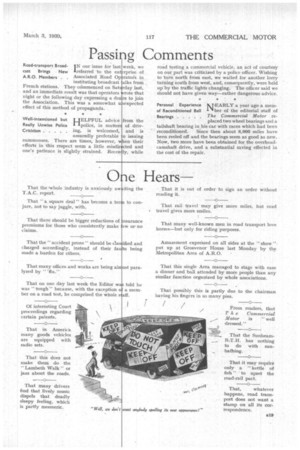One Hears
Page 29

If you've noticed an error in this article please click here to report it so we can fix it.
That the whole industry is anxiously awaiting the T.A.C. report.
That "a square deal" has become a term to conjure, not to say juggle, with.
That there should be bigger reductions of nsurance premiums for those who consistently make .ew or no claims.
That the "accident prone" should be classified and charged accordingly, instead of their fau its being made a burden for others.
That many offices and works are being alrrost paralyzed by " 'flu."
That on one day last week the Editor was told he was "tough" because, with the exception o: a member on a road test, he comprised the whole s aff.
Of interesting Court proceedings regarding certain patents.
That in America many goods vehicles are equipped with radio sets.
That this does not make them do the "Lambeth Walk" or jazz about the roads.
—0_ That many drivers find that lively music dispels that deadly sleepy feeling, which is partly mesmeric. • That it is out of order to sign an order without reading it.
That rail travel may give more miles, but road travel gives more smiles.
That many well-known men in road transport love horses—but only for riding purposes.
Amazement expressed on all sides at the show " put up at Grosvenor House last Monday by the Metropolitan Area of A.R.O.
That this single Area managed to stage with ease a dinner and ball attended by more people than any similar function organized by whole associations.
That possibly this is partly due to the chairman having his fingers in so many pies.
From readers, that h e Commercial Motor is "well dressed."
That the Sunbeam13..T.H. has nothing to do with sunbathing.
That it may require only a "kettle of fish" ' to upset the road-rail pact.
That, whatever happens, road transport does not want a stamp on all its correspondence.




















































































